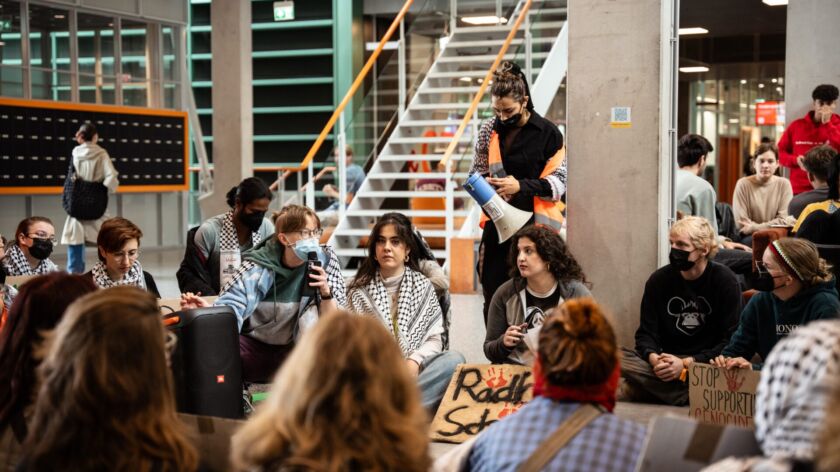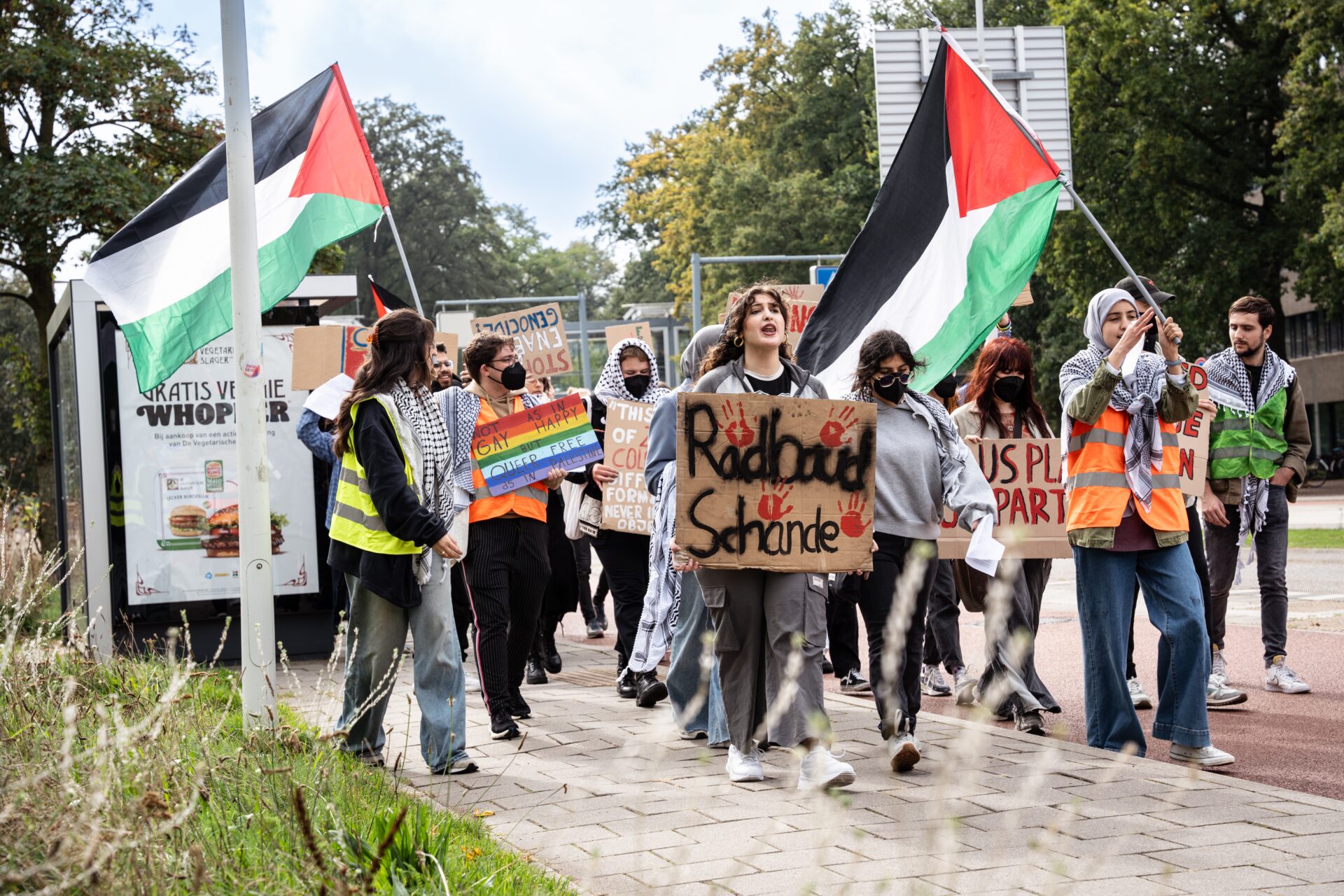‘The Partnerships Advisory Committee is no solution, but a stalling tactic’
-
 A recent demonstration in the Huygens building. Photo: Johannes Fiebig
A recent demonstration in the Huygens building. Photo: Johannes Fiebig
OPINION - The advisory committee that will review international collaborations at Radboud University is not a solution but a stalling tactic. This is what students Aya Ahlalouch and Sjoerd Nefs from Nijmegen Encampment write. 'It is a bureaucratic smokescreen meant to buy time and distract from the fact that the university refuses to take a stand.'
Since October 2023, students at Radboud University have laid out a clear and principled set of demands for our university: condemn the genocide in Gaza, disclose the university’s ties to complicit entities, boycott, and divest. Yet, while Israel relentlessly bombs Gaza and oppresses Palestinians, Radboud University continues its partnerships with Israeli institutions deeply embedded in Israel’s military-industrial complex.
These ties involve institutions directly engaged in the development of military and surveillance technologies used in attacks on Palestinian civilians, such as the Technion Institute, Haifa University, Tel Aviv University, and the Hebrew University. To remain in these partnerships is to support and approve of Israel’s violent campaigns, making the university an accessory to the ongoing genocide.
‘We are not asking for something radical or unreasonable. We ask that our university takes a principled stand on one of the most clear-cut moral crises of our time’
Radboud University has not responded to our demands by taking meaningful action nor by giving moral clarity. Instead, they have formed the ‘Partnership Advisory Committee’ – a body with no binding authority to affect real change – supposedly to advise the university on institutional partnerships. This is not a solution, but a stalling tactic.
We are not asking for something radical or unreasonable. We ask that our university takes a principled stand on one of the most clear-cut moral crises of our time. Gaza is under genocidal siege, Israel continues its occupation of multiple Arab lands, while bombs are raining down on Lebanon, Syria, and Yemen. War crimes are committed with impunity every day.
Yet, the Executive Board (cvb) refuses to even acknowledge these facts. They refer to the genocide as a ‘very complex question’ that the advisory committee will be working on. However, it is evident that Israel is the occupying power under international law (as condemned by the International Court of Justice) and is ethnically cleansing Palestinians. Recognizing oppression is not complicated when it is unfolding in plain sight. The cvb claims they do not want to contribute where people’s rights are being violated, but by refusing to act, they are doing just that.
False arguments
This committee is not about seeking real answers or taking principled action. It is about pushing the problem down the road, hoping the outrage fades with time. From the very beginning, it has been clear that the cvb is not planning to sever ties with Israeli institutions. Their justifications for this are steeped in rhetoric designed to sound thoughtful, but in reality, serve to distract from the university’s unwillingness to confront the actual issues.
Since October 2023, the executive board has clung to the banner ‘academic freedom’ as their defense, but that argument simply does not hold. Our demand is not about isolating individual academics; it’s about breaking institutional ties with universities that are complicit in genocide. In an article published by Trouw, the cvb spoke of values like ‘freedom, justice, and respect for human rights’. Yet, when confronted with their failure to live up to those principles, they suddenly retreat behind the shield of academic freedom, twisting it into an excuse for complicity. This is a blatant distortion: true academic freedom exists to foster critical thought and protect the ability of academic institutions and individuals to stand up for moral principles, not to be weaponized as a justification for remaining complicit in atrocities.
Another weak argument the cvb has floated is the need to ‘keep an open line’ with Israeli institutions. They have maintained this stance since October 2023, despite the fact that their first contact with these institutions occurred last summer. Yet, this promise still rings hollow. In an article on Vox, the head of the ethics committee admitted that ‘it’s not their goal to push Dutch moral values onto Israeli institutions.’
So what, then, is the purpose of keeping these open lines? ‘To share concerns about human rights violations’, they said. However, the cvb does not elaborate on the content of these discussions or the goal behind sharing such concerns. If there is no intention to act on these concerns, why bother? This is nothing but another performative gesture, designed to silence criticism without committing to meaningful change.
No transparency
The issue of transparency – or rather the lack of it – cannot be ignored. The cvb has been far from open about its ties to Israel. While they have shared fragments of information, it is incomplete. This became evident when students conducted their own research and uncovered more collaborations between Radboud University and Israeli institutions than initially revealed by the Executive Board. The cvb’s selective disclosure shows a deliberate unwillingness to be fully open about the university’s involvement, and it is impossible to take their claims of accountability seriously when they have already proven themselves to be withholding critical information.
‘The cvb has no interest in fostering genuine critical thinking’
The secrecy surrounding the establishment of the committee is just as troubling. No clear explanation has been given of how its members were chosen, aside from the vague assertion that they are ‘independent thinkers’. Yet, one of these so-called independent thinkers has publicly opposed a Pro-Palestine protest – a stance that raises immediate questions about their objectivity. Meanwhile, the university’s academic experts on human rights, genocide, international law or the situation in Palestine – those who could bring critical, informed perspectives – were notably excluded from the process, with none contacted to join the committee.
When the committee’s members seem pre-determined to toe the line of institutional inaction, and the selection process itself is done in secrecy, it becomes painfully clear that the cvb has no interest in fostering genuine critical thinking or seeking honest advice.
No advice needed
The cvb is under no obligation to follow the recommendations of this committee. Even if the committee were to miraculously deliver a clear-cut, principled recommendation, the cvb would be free to ignore it – and they almost certainly would. Their cozy ties with Hebrew University, built on illegally stolen and occupied Palestinian lands and significantly complicit in establishing and maintaining the Israeli Apartheid system, make this abundantly clear. Despite the ICJ’s ruling that Israeli settlements in these occupied territories violate international law – a point we directly confronted the cvb with – they continue to look the other way, fully aware they have the power to sever these ties yet willfully choosing not to.
The establishment of this advisory committee is entirely unnecessary, as it will only provide advice on issues that are already widely known globally. Action should have been taken long ago. The cvb is simply using this committee to prolong the decision-making process and pretend that further deliberation is needed, even though the facts have long been clear. What we demand is not more procedural delays or empty gestures – we demand real action.




